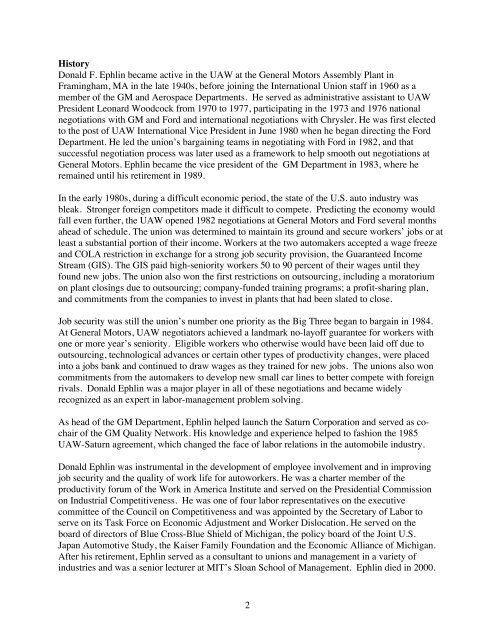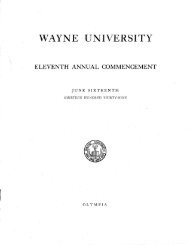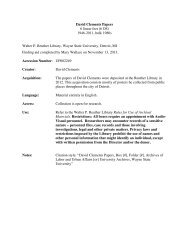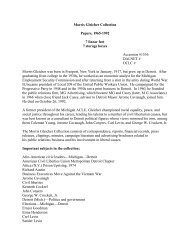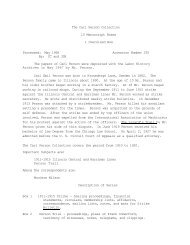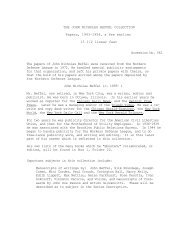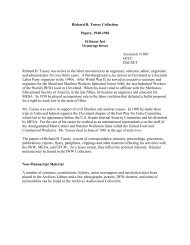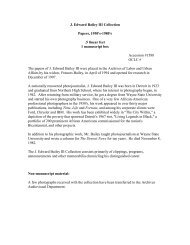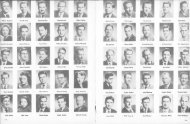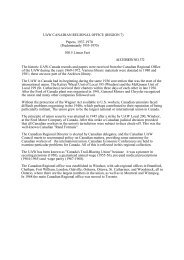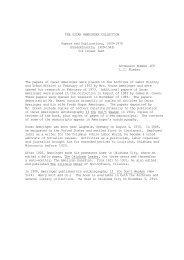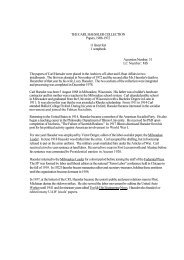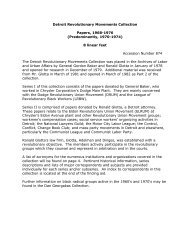UAW Vice President's Office - Walter P. Reuther Library - Wayne ...
UAW Vice President's Office - Walter P. Reuther Library - Wayne ...
UAW Vice President's Office - Walter P. Reuther Library - Wayne ...
Create successful ePaper yourself
Turn your PDF publications into a flip-book with our unique Google optimized e-Paper software.
History<br />
Donald F. Ephlin became active in the <strong>UAW</strong> at the General Motors Assembly Plant in<br />
Framingham, MA in the late 1940s, before joining the International Union staff in 1960 as a<br />
member of the GM and Aerospace Departments. He served as administrative assistant to <strong>UAW</strong><br />
President Leonard Woodcock from 1970 to 1977, participating in the 1973 and 1976 national<br />
negotiations with GM and Ford and international negotiations with Chrysler. He was first elected<br />
to the post of <strong>UAW</strong> International <strong>Vice</strong> President in June 1980 when he began directing the Ford<br />
Department. He led the union’s bargaining teams in negotiating with Ford in 1982, and that<br />
successful negotiation process was later used as a framework to help smooth out negotiations at<br />
General Motors. Ephlin became the vice president of the GM Department in 1983, where he<br />
remained until his retirement in 1989.<br />
In the early 1980s, during a difficult economic period, the state of the U.S. auto industry was<br />
bleak. Stronger foreign competitors made it difficult to compete. Predicting the economy would<br />
fall even further, the <strong>UAW</strong> opened 1982 negotiations at General Motors and Ford several months<br />
ahead of schedule. The union was determined to maintain its ground and secure workers’ jobs or at<br />
least a substantial portion of their income. Workers at the two automakers accepted a wage freeze<br />
and COLA restriction in exchange for a strong job security provision‚ the Guaranteed Income<br />
Stream (GIS). The GIS paid high-seniority workers 50 to 90 percent of their wages until they<br />
found new jobs. The union also won the first restrictions on outsourcing, including a moratorium<br />
on plant closings due to outsourcing; company-funded training programs; a profit-sharing plan,<br />
and commitments from the companies to invest in plants that had been slated to close.<br />
Job security was still the union’s number one priority as the Big Three began to bargain in 1984.<br />
At General Motors, <strong>UAW</strong> negotiators achieved a landmark no-layoff guarantee for workers with<br />
one or more year’s seniority. Eligible workers who otherwise would have been laid off due to<br />
outsourcing, technological advances or certain other types of productivity changes, were placed<br />
into a jobs bank and continued to draw wages as they trained for new jobs. The unions also won<br />
commitments from the automakers to develop new small car lines to better compete with foreign<br />
rivals. Donald Ephlin was a major player in all of these negotiations and became widely<br />
recognized as an expert in labor-management problem solving.<br />
As head of the GM Department, Ephlin helped launch the Saturn Corporation and served as cochair<br />
of the GM Quality Network. His knowledge and experience helped to fashion the 1985<br />
<strong>UAW</strong>-Saturn agreement, which changed the face of labor relations in the automobile industry.<br />
Donald Ephlin was instrumental in the development of employee involvement and in improving<br />
job security and the quality of work life for autoworkers. He was a charter member of the<br />
productivity forum of the Work in America Institute and served on the Presidential Commission<br />
on Industrial Competitiveness. He was one of four labor representatives on the executive<br />
committee of the Council on Competitiveness and was appointed by the Secretary of Labor to<br />
serve on its Task Force on Economic Adjustment and Worker Dislocation. He served on the<br />
board of directors of Blue Cross-Blue Shield of Michigan, the policy board of the Joint U.S.<br />
Japan Automotive Study, the Kaiser Family Foundation and the Economic Alliance of Michigan.<br />
After his retirement, Ephlin served as a consultant to unions and management in a variety of<br />
industries and was a senior lecturer at MIT’s Sloan School of Management. Ephlin died in 2000.<br />
2


